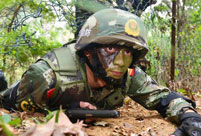 Africans in Guangzhou
Africans in Guangzhou
 Pole dancer shows strength and beauty up in the air
Pole dancer shows strength and beauty up in the air
 College girls call for protection of ecological space on earth
College girls call for protection of ecological space on earth
 Top 10 celebrities driving auto brands
Top 10 celebrities driving auto brands
 10 low-carbon tips to save money
10 low-carbon tips to save money
 Luxury cars make Asia premiere at Auto China
Luxury cars make Asia premiere at Auto China
 Versatile dog
Versatile dog
 Ni Ni covers BAZAAR JEWELRY
Ni Ni covers BAZAAR JEWELRY
 Cherry blossoms reach peak bloom in Washington D.C.
Cherry blossoms reach peak bloom in Washington D.C.
 Top Chinese fashion icons in foreigners' eyes
Top Chinese fashion icons in foreigners' eyes
Zhang Linghe is still tortured by memories of the kidnapping of a high-school girl four years ago. At the time, Zhang, a soldier-turned-policeman arrived on the scene to encounter a knife-wielding man who was threatening to cut the girl's throat. When the criminal asked for a mobile phone and a car, Zhang obliged him, but that didn't stop the suspect from killing her before fleeing.
Zhang, armed with nothing but a truncheon, could do little to stop him. He still wishes he had been armed with a gun. The experience made him a strong supporter of a Shanghai policy launched on April 20, which has armed around 1,000 police for round-the-clock patrols.
They are required to arrive at the scene within three to five minutes if any emergency incident occurs which threatens the lives of residents or is a threat to public security.
The violent terrorist attack at a train station in Kunming, Yunnan Province, in early March, in which eight knife-wielding attackers killed 29 people, raised public fears about the ability of public security departments to deal with violent criminals.
The Ministry of Public Security then announced on March 16 that armed patrols across the country should be intensified.
As several cities have started to implement the policy, issues regarding the training of police officers and gun control have emerged.
Meticulous checks
Before the patrolmen walk out of the police stations, they now receive a 9-millimeter revolver designed specifically for Chinese police. Each patrolman is registered with a specific gun which has a 10-digit serial number.
The first thing they do is check the gun. They open the revolver to see if there are any bullets left inside, then close it and unlock the safety, and fire one shot into a specially designed sand case to see if the gun works normally. Finally, they lock the safety again and insert the gun into its belt set.
Bullets also have to be checked. The officers provide their gun usage permits and badges to verify their identities to complete the procedure.
The 1,000 officers who make up the first group of armed patrolmen in Shanghai were chosen from some 4,000 candidates who went through four rounds of screening, including psychological and skill assessments.
Each armed patrolman has to pass a set of 187 questions as part of a personality test. Certain questions appear repeatedly to evaluate the police officers' feelings and emotions.
"One question says 'I will feel nervous and fearful when I see a dangerous animal, even if it is caged.' A 'yes' answer indicates that the officer's psychological pressure could be huge," Cai Ruijun, an official of the education and training department of the Changning District Public Security Bureau in Shanghai, told the Oriental Morning Post.
According to Rui Minghua, an official with Shanghai Municipal Public Security Bureau, the offers had one month of shooting training. All the patrolmen achieved the tasks, which included taking out their guns, loading them, and hitting their targets within 15 seconds of seeing them. To become qualified, an officer must hit the target at least three times with six bullets.
Rui said the introduction of the patrols shows that the authorities have a strong resolution to fight crime and maintain order, adding that he hopes it increases people's sense of security.
Cities in other provinces have also started or are planning to introduce armed patrols. SWAT members have started 24-hour patrols on the streets of Zhuhai and Guangzhou in Guangdong Province, will implement the policy on May 1.
Public doubts
Not everyone is enthusiastic about the policy. While some say they provide a sense of security, others worry about supervision over the guns.
Their fears are at least partly grounded - public outrage was stoked by a fatal shooting of a pregnant woman in October last year, by a drunk police officer who was sentenced to death over the incident in February. In recent years there have also been other isolated instances of police shooting ordinary people dead, prompting fears they were "trigger happy."
An online survey showed that 74.9 percent of Net users think armed patrols will have positive effect on public security, while 7.79 percent think it won't. Another 17.3 percent think the effect remains unknown at the moment, according to a China Central Television program.
Professor Zhang Youde from the Shanghai University of Political Science and Law said armed patrols are an improvement. "Police officers such as the customs anti-smuggling police have already been armed with guns. If police have no chances, conditions or the right to use guns when facing criminals, how can they effectively carry out their responsibilities?"
But Zhang also said that the concern from the public is natural. "But such worry does not mean it is unnecessary for the police to be armed. Good gun management is not about keeping them in a safe place and not using them. The authorities must set up modern, professional police teams with high standards, from the selection of armed patrolmen to the responsibilities they bear," said Zhang.
When criminals are armed
Though China has some of the world's most restrictive gun laws, guns made privately and secretly in many parts of the country have slipped into criminals' hands.
Police in Guizhou Province recently confiscated some 15,000 illegally manufactured guns. Given the increasing numbers of violent crimes, police must improve their skills in order to maintain public security, said Zhang.
In order to assure the safety of the revolver, patrol officers in Shanghai are required to keep one of their hands on the weapon all the time during their patrols. One of the patrolmen told Shanghai media that he would not even enter a juice shop to buy drinks in case he let go of the gun fixed in his belt. Armed patrolmen are also forbidden to dine at public venues with their guns.
The Shanghai Municipal Public Security Bureau allows the armed patrolmen to use their guns in 15 situations, including when residents are threatened by people with weapons, explosives or toxic substances. The police officers have to report every time they draw their revolvers no matter whether they fire a shot or not. And a detailed written report has to be filed to the bureau within six hours after a shot is fired.
 Hand-painted maps go viral online; painter's name remains unknown
Hand-painted maps go viral online; painter's name remains unknown 4th Beijing Int'l Film Festival ends
4th Beijing Int'l Film Festival ends Commando elite specializes in sign language
Commando elite specializes in sign language Man photoshops himself into girlfriend's childhood photos
Man photoshops himself into girlfriend's childhood photos Photo story: Stallholders at Beijing Zoo Wholesale Market
Photo story: Stallholders at Beijing Zoo Wholesale Market Artists on backstage
Artists on backstage Beckham launches fund to support youth soccer in China
Beckham launches fund to support youth soccer in China Cherry blossoms hit peak bloom in Washington D.C.
Cherry blossoms hit peak bloom in Washington D.C. Children in ancient costumes learn Zhusuan
Children in ancient costumes learn Zhusuan Cute Shaolin boy melts the hearts of millions
Cute Shaolin boy melts the hearts of millions Giant panda Sijia is back to happy life
Giant panda Sijia is back to happy life Richest Chinese of 2014: half from the mainland
Richest Chinese of 2014: half from the mainland Chengdu - laid-back lifestyle makes happiest city
Chengdu - laid-back lifestyle makes happiest city The backstage of the Fashion Week
The backstage of the Fashion Week College students in Han costumes
College students in Han costumesDay|Week|Month